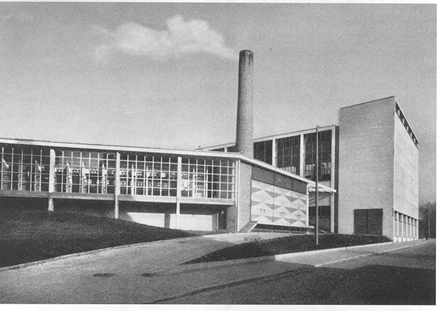History

In 1921, Prof. Robert ENGEL took over the Institute for Steam Boiler Construction, Piston Steam Engines, Locomotive Construction and Load Conveying Engines. Research areas included labyrinth flows, oil-free steam engines and high-speed steam generators. Around 1928 the institute moved to the new building in the Kopernikusgasse.
1949 Prof. Paul Roman Gilli was the new appointed head of the institute. The main research projects at that time were exhaust gas measuring devices, later also the heat transfer and especially the film evaporation limit for highly loaded fin walls of modern high-pressure boilers and steam generators of nuclear power plants with gas-cooled reactors.
1954 Karl Trutnovsky received the venia legendi for thermal engineering with his habilitation about experiments on non-stationary flow through labyrinths.
1968 After Prof. Paul Roman Gilli´s retirement in 1966, Prof. Paul Viktor Gilli was elected as new head of the institute. In 1973, as a result of the oil crisis, the research areas were expanded to include energy-saving systems for heating and air-conditioning technology as well as solar energy and heat pump projects.
1975 Gundolf E. von Rajakovics received the venia legendi for thermal engineering with his habilitation about extremely high power plant efficiencies using a triple steam process.
1980 The Institute of Thermal Engineering (IWT) was founded with 2 divisions:
- Heating and Air Conditioning Technology and
- Thermal Measurement and Testing.
Prof. Paul Viktor Gilli was the elected head of the Institute of Thermal Engineering until his retirement in 1994. The research focus of the institute was about heat pumps and efficiency increase of thermal power plants, respectively.
1980 Hermann Halozan received the venia legendi for thermal engineering with his habilitation about the outdoor air heat pump. 1982 Hermann HALOZAN became an associate professor at the institute. He supervised many PhD students and was a very active researcher in the field of heat pumps. Hermann Halozan retired in 2005.
1982 Alois Edler received the venia legendi for thermal engineering with his habilitation about heat pumps with combustion engine operation, basics - design - operating behavior.
1983 Alois Edler became an associate professor at the institute. He retired in 2003.
1985 The Institute of Thermal Engineering relocated from the Kopernikusgasse to the new campus in the Inffeldgasse.
1989 Josef Spitzer received the venia legendi for thermal engineering with his habilitation about the comparison of energy-economic recommendations for the realization of energy-political goals in space heating. Until his retirement, Josef SPITZER worked as a senior scientist at the Institute for Energy Research at Joanneum Research.
1995 Prof. Beate Reetz was appointed as the new head of the institute. The research areas were extended to include the efficient use of biomass. Prof. Beate REETZ founded a small research group on gasification of biomass at the institute.
1997 Wolfgang Streicher received the venia legendi for thermal engineering with his habilitation about partial solar space heating, design and hydraulic integration. Wolfgang STREICHER became an associate professor at the institute in 1997. In 2000 he has established a new research group for solar energy and thermal building simulation. In this group, various research projects on thermal solar systems, energy storage systems and energetic building simulations are developed.
2004 Prof. Beate Reetz retired.
2006 René Rieberer received the venia legendi for thermal engineering with his habilitation about "Contributions to heating, refrigerating and air-conditioning technology". Since 2005 he is leading the Heating, Refrigeration and Air-Conditioning research group. René RIEBERER became an associate professor at the institute in 2006. He also founded the Werner Hochegger Foundation in 2011 and has managed it ever since. René RIEBERER supervised many PhD students and is a very active researcher in the field of heating, ventilation and air conditioning.
2007 Prof. Jürgen Karl took over the Institute of Thermal Engineering as head of the institute. His research focuses on biomass gasification, heat pipe reformers and SOFCs.
Since 2007 the Institute of Thermal Engineering consists of three working groups:
- Thermal Energy Systems and Biomass
- Heating, Refrigeration and Air-Conditioning
- Energy-Efficient Buildings
2009 Wolfgang Streicher left the Institute of Thermal Engineering because he was appointed as a professor for Energy-efficient construction with special consideration of the use of renewable energies at the university in Innsbruck. From 2010 until today the Energy-Efficient Buildings research group is led by 4 senior scientists: Andreas Heinz, Richard Heimrath and Thomas Mach.
2011 Prof. Jürgen Karl left the Institute of Thermal Engineering. Jürgen KARL was elected head at the Institute of Energy Process Engineering at University Erlangen-Nürnberg (Germany).
2012 Prof. Christoph Hochenauer was elected as head of the institute. Among other things, he heads the research group: Thermal Energy Systems and Biomass. His research areas include SOFC, SOEC, biomass, high temperature processes and CFD simulations.
2015 Prof. Robert Scharler joined the institute. Robert SCHARLER leads the research group Sustainable, clean and bioenergy systems.
2017 Vanja Subotic was appointed assistant professor at the institute to establish an independent research group on Solid Oxide Cells.
2019 René Prieler was appointed assistant professor at the institute to establish an independent research group on high temperature processes.
2015 - 2021 the laboratory infrastructure of the institute was constantly upgraded and expanded. Massive efforts have been made to raise funds for new and replacement investments at the institute. The main investments and innovations are listed below:
- An existing fuel cell laboratory was expanded with an electrolysis cell laboratory to include three additional test rigs for high-temperature fuel cells (SOFC) and high-temperature electrolysis cells (SOEC).
- A biomass fixed bed gasifier for various fuels and gasification media (air, O2 and H2O) has been set up.
- A research furnace with a capacity of approx. 1 MW, which is suitable for a variety of liquid and gaseous fuels, as well as for all technically relevant oxidizers (from air to pure oxygen and all mixtures) was installed.
- Two state-of-the-art chemistry laboratories were equipped to analyse various fuels and to conduct experiments with bioreactors in the field of biotechnology.
- Furthermore, a new teaching laboratory with state-of-the-art equipment suitable for various laboratory tutorials and lectures is now available at our institute.
- In addition, we have a new HVAC laboratory with a central gas supply of various gases, as well as an integrated heat source and sink with a theoretical output in the range of approx. 100kW.
2020 Andres Anca-Couce received his venia legendi for thermo-chemical bioenergy systems with his habilitation about detailed reaction schemes for biomass pyrolysis.
2022 Priv.-Doz. Dr. Anca-Couce leaves the Institute of Thermal Engineering of the Graz University of Technology. He will become a professor at the Energy Systems Engineering Research Group, which is part of the Heat and Fluid Engineering Institute of the University Carlos III in Madrid. His research activities will continue to focus on biomass thermochemical processes.
2022 Vanja SUBOTIC received the venia legendi for thermal engineering with her habilitation on "High-temperature solid oxide fuel cells and electrolysers". She continues to lead the fuel cell research group. Vanja SUBOTIC became Associate Professor at the Institute in 2023.
2022 the Institute's laboratory infrastructure in the hydrogen research area was significantly expanded. New test benches for co-electrolysis and new combustion chambers for any mixture of hydrogen and natural gas were put into operation. In addition, three new gas analysers, a laser spectrometer and a chemiluminescence meter were put into operation to enable the measurement of flames and gas concentrations at the highest level. The acquisition of a new impedance spectroscope for high power also enables the characterisation of larger stacks and modules in the SOFC-SOEC research field. The construction of an electrolyser that will provide hydrogen for four institutes at TU Graz will also start in 2023. Commissioning of the electrolyser is planned for 2025.
2024 René PRIELER received the venia legendi for thermal engineering with his habilitation on „Modelling of the fluid/solid interaction in fire resistance testing“. He continues to head the research group for high-temperature processes. René PRIELER became Associate Professor at the institute in 2024.
Room: MB05 010 (5.OG)
Tel.: +43 316/873 7301
office.iwt@tugraz.at
Inffeldgasse 25/B
A 8010 Graz
